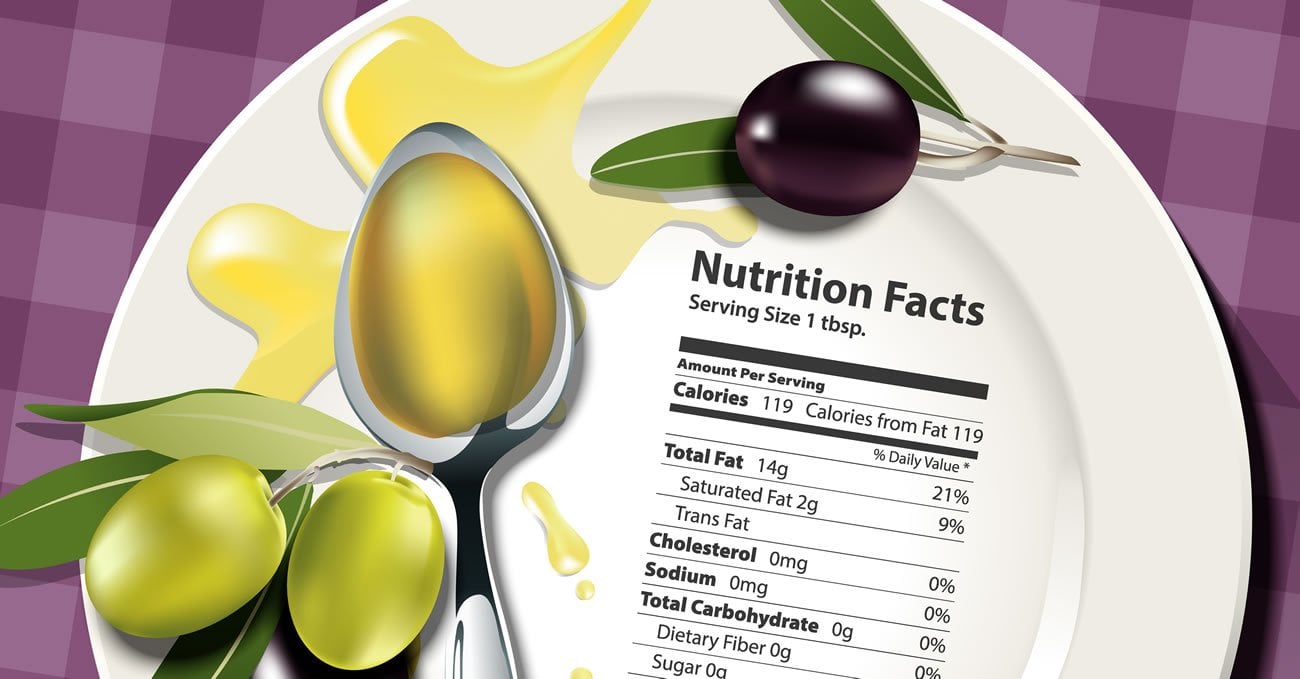I don’t need to lose weight, so is olive oil okay?
Olive oil is about 14% saturated fat, so if you’re pouring olive oil into your skillets and food every day, you’re likely consuming significantly more artery-clogging saturated fat than you realized.

But even if you’re normal weight, be careful about olive oil, or any oil for that matter. That’s because oils are the most calorie-dense foods on earth.
Just a half cup of olive oil has about the same amount of calories as:
2 Big Macs
or 2 large orders of French fries
or 3½ slices of pepperoni pizza
You get the idea. If you’re using olive oil regularly, it wouldn’t take much to go overboard on calorie intake and start putting on the pounds.
Just 100 extra calories a day (there are 100 calories in less than 1 tablespoon of olive oil) translates into about 10 added pounds per year.
So use oil sparingly, even if your body weight is normal, which means a BMI (body mass index) of 24.9 or below. Body mass index is a measure of body fat based on height and weight. To calculate your BMI, go HERE.
And keep in mind that weight gain is not the only problem with oils. Meals high in fat – any type of fat – including oil (which is 100% fat) have also been found to increase levels of inflammatory substances in the blood1 and boost production of substances called cholesterol remnants that contribute to the growth of cholesterol-filled plaques.2
Bottom Line | Is olive oil okay?
Olive oil is not only exceedingly calorie-dense, it is nutrient-poor. It is a very meager source of essential fatty acids.
Keep in mind, too, that all oils are a mixture of saturated, monounsaturated, and polyunsaturated acids (though they’re usually called by the name of the fatty acid that is most abundant). Olive oil is about 14% saturated fat, so if you’re pouring olive oil into your skillets and food every day, you’re likely consuming significantly more artery-clogging saturated fat than you realized.
It is best to use oils that have the least amount of saturated fat and the most amounts of healthful ingredients like omega-3 fatty acids and phytonutrients. The oil that best fits these criteria is canola oil.
Other acceptable choices include extra virgin olive oil, safflower oil (only varieties high in oleic acid), sesame seed oil, peanut oil, walnut oil, hazelnut oil, and almond oil.
But again, use them sparingly.
General Pritikin guidelines for oils and all other fats:
What’s best for long-term weight control
While it’s certainly true that fewer calories are required to promote and maintain weight loss, the key to consuming fewer calories appears not to be counting or focusing on calorie intake.
What’s most effective for long-term weight control is choosing foods that have the greatest satiety per calorie.
Foods with a high satiety-to-calorie ratio do a great job of filling you up with satisfying amounts of food, but at a very low calorie cost.
Here’s how to boost your satiety-to-calorie ratio…
First of all, cut down dramatically on foods with little satiety per calorie, such as foods full of fats, oils, sugars, and refined carbohydrates.
The most satiating foods per calorie
Secondly, replace those fats, oils, sugars, and refined carbs with foods that are on the opposite side of the satiety spectrum, that is, foods that have a high satiety-to-calorie ratio, like:
- Whole fruits
- Whole vegetables
- Beans and legumes (pinto beans, black beans, etc)
- Cooked-in-water whole grains (oatmeal, brown rice, whole-wheat pasta, etc)
In doing so, you’re also increasing your fiber-to-calorie ratio, which is another key to long-term weight control.
Sources
- 1 Journal of the American College of Nutrition, 2007; 26: 163.
- 2 Current Vascular Pharmacology, 2011; 9 (3): 281.